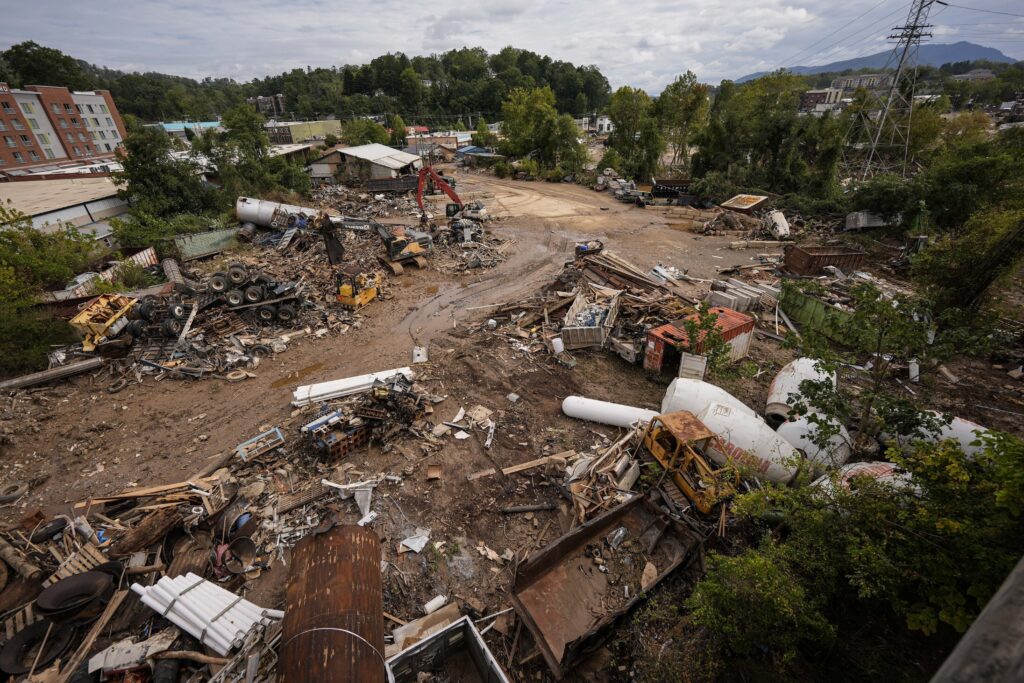Will Hurricane Helene Disrupt Elections in North Carolina?

Hurricane Helene ravaged multiple southern states last week, leaving significant damage in its wake, with only a month until the 2024 election. The hurricane affected North Carolina the most, hitting the western part of the state the hardest.
“This storm is like nothing we’ve seen in our lifetimes in Western North Carolina. The destruction is unprecedented, and this level of uncertainty this close to Election Day is daunting,” Karen Brinson Bell, executive director of the North Carolina State Board of Elections, said.
People’s voting rights are often threatened in natural disasters as many factors make it harder to vote.
The storm hit as voters were still registering and requesting absentee ballots, with some even starting to cast their mail-in votes, since the state started sending out ballots on Sept. 20.
North Carolina was forced to close 12 county election offices, which process absentee ballot requests and enter new voter registrations into the system, according to Bell. As of Wednesday morning, there are still 10 offices closed.
Burke County, one of the counties affected by the hurricane, announced it had to postpone its Tuesday meeting to review absentee ballots to next week.
The voter registration deadline for the 2024 election is Oct. 11, which is fast approaching. Bell said on Tuesday that its members will deploy emergency kits known as “election offices in a box,” to three or four counties, so they can continue their work even if phone and internet service is out.
Also, election officials across the state have come together to provide support.
“I’ve been overwhelmed, but not surprised, by the offers of help from county boards of elections in parts of the state not affected by the storm to help their colleagues in western North Carolina,” Bell said. “And I know that support will continue.”
Bell added that once the election offices open back up, officials can start to assess early voting sites and Election Day polling places to “see the extent of the damage and which facilities won’t be available.”
Then, there may be challenges for voters when they cast their ballots. In the storm, many individuals likely lost some if not all of their belongings, including photo IDs. In-person early voting begins on Oct. 17, and Election Day is only a month away.
The state has a voter ID requirement, but there is a Photo ID exemption form. Specifically, there is an exception for a voter who “was a victim of a natural disaster within 100 days before Election Day that resulted in a disaster declaration by the President of the United States or the Governor of North Carolina,” which would apply to voters in the 25 counties under a disaster declaration.
North Carolina Gov. Roy Cooper (D) has spoken on the rescue, relief and recovery efforts in the state and will likely announce soon what executive actions he will take to help the election run smoothly.
Hurricane Helene also hit Florida, which dealt with a similar situation two years ago when Hurricane Ian made landfall in the month leading up to the 2022 election. However, the damage in Florida now is far less significant than the previous storm.
During Ian, Governor Ron DeSantis (R) issued an executive order to allow certain counties to take emergency measures, like extending early voting, designating additional early voting locations, allowing voters to have absentee ballots delivered to a different address and increasing the pool of eligible poll workers.
In a statement Tuesday, DeSantis said the Florida Department of State, Division of Elections has contacted USPS about election information and vote-by-mail ballots.
Currently in North Carolina, a voter displaced by the storm can have an absentee ballot sent to an alternate location, according to the state elections board.
North Carolina also continues to face challenges with mail-in voting because the U.S. Postal Service was forced to close almost 40 delivery facilities due to storm damage. Also, the hurricane caused USPS to shut down around 85 facilities in Georgia, over 100 in South Carolina, over 40 in Florida and more than a dozen in Tennessee. Some facilities have re-opened, but there are still mass closures.
“We have been and continue to be in regular contact with our state and federal partners, as well as the U.S. Postal Service, to monitor where we are with road accessibility and mail delivery,” Bell said.
Despite all the obstacles that North Carolina and its neighboring states face in administering the election, Bell said she remains hopeful.
“Just go back to 2020, when we held an incredibly successful election with record turnout during the Covid pandemic. We’ve battled through hurricanes and tropical storms, too, and still held safe and secure elections. And we will do everything in our power to do so again,” Bell said.